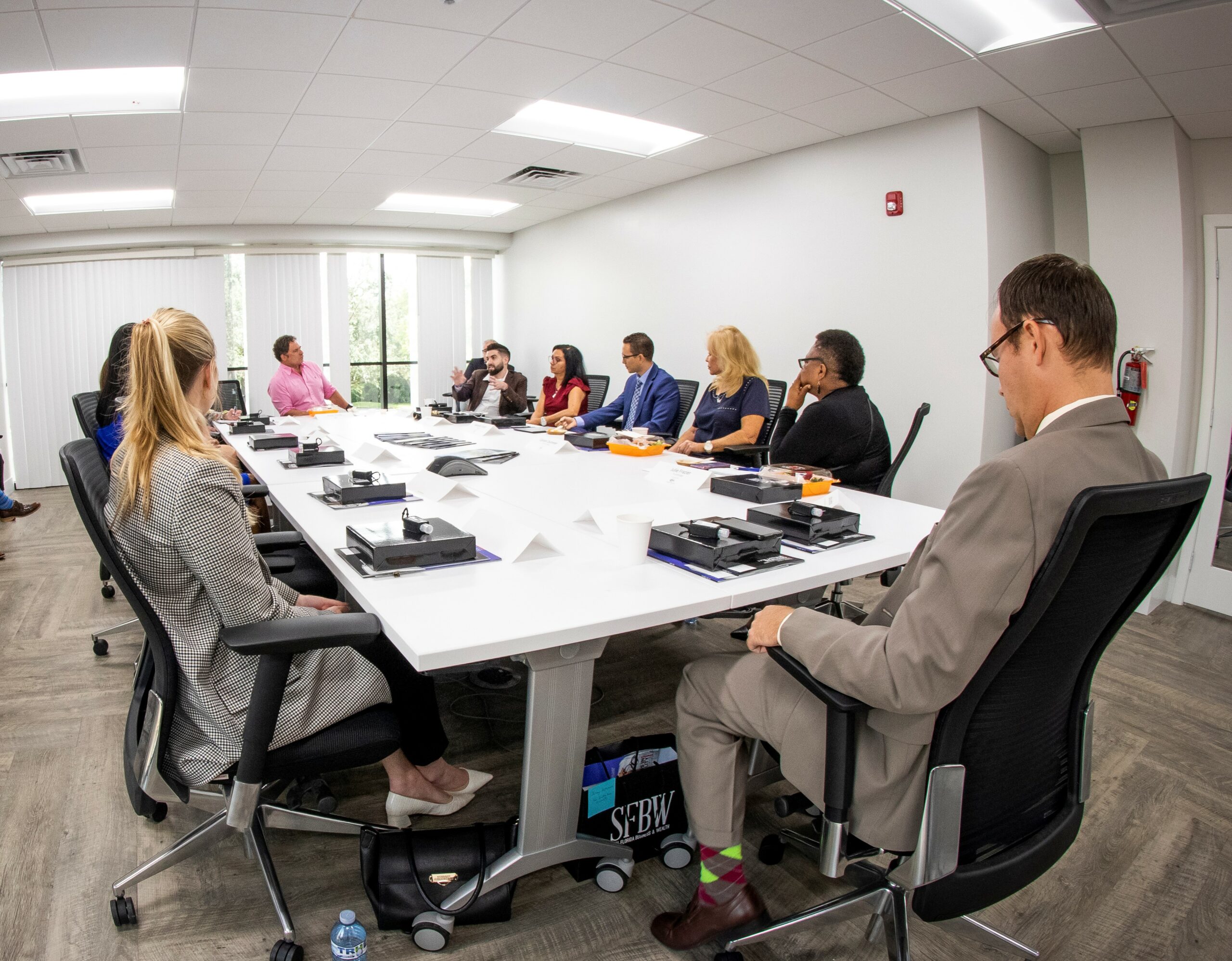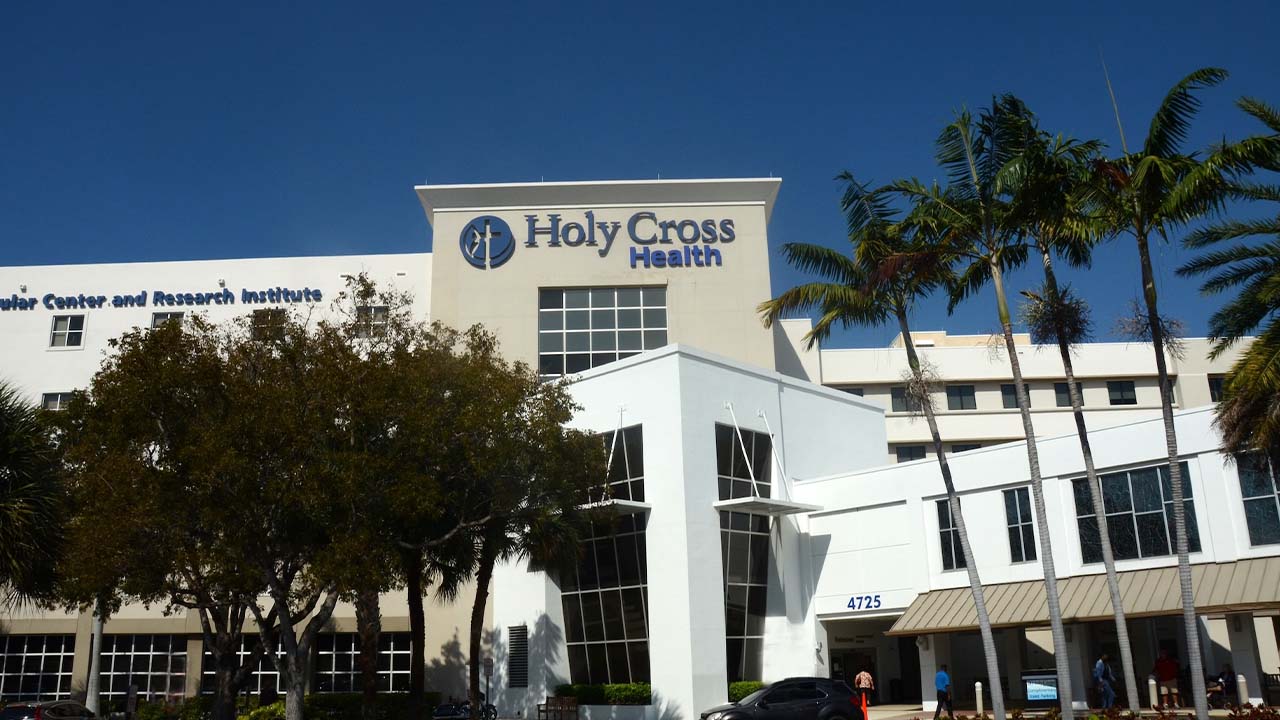Given the extent to which health care matters impact a range of industries, SFBW was inspired to convene a roundtable of experts in their respective fields to share what they’ve been experiencing on a day-to-day basis. The varied perspectives on display proved edifying for all the participants: While Michael Swartz, president of Health Karma in Fort Lauderdale, grew animated when describing the reinvestment strategy of his company during COVID, Stephanie Zeverino, director of business development, South Florida, Belmont Village Senior Living, enthused about the adoption of telemedicine among her residents. The event was held just after masking restrictions had been relaxed and before the delta variant has made its presence widely felt, so the meeting was emotional as well as professional due to the novelty of colleagues being able to interact maskless and face-to-face.
Marcelle Turner, vice president of marketing strategy at Bankers Healthcare Group, co-hosted the event with SFBW editor-in-chief Drew Limsky. (BHG was the presenting sponsor of SFBW’s inaugural Excellence in Healthcare Awards last spring.) These are some moments from a wide-ranging discussion.
VACCINE UPTAKE
Stephanie Zeverino:
“We are mandating vaccines for all our employees. We are a female-led company, and our CEO is very passionate about keeping our residents safe in a senior living environment.”
Mindy Richman:
“Pediatricians offices are flooded with kids with positive COVID-19 tests, usually with the new variant, and they’re all mingling in the same office when they go in for testing or treatment. A lot of the numbers of new cases are being found in pediatric cases, and the problem is these younger people who are unable to get vaccinated are infecting others—in camps and daycare. Grandparents like to see grandchildren, but people forget that the older population, vaccinated or not, are still at risk.”
Jeremy Katzman:
“Our president was one of the first to announce a requirement of the vaccinations for all faculty, students and staff. The response was mixed, like everything else. Since we do receive grants from the state, we then had to walk that policy back. We have a voluntary vaccination program where you can self-report your status online.”
Michael Swartz:
“I think we missed the ball by not incentivizing the vaccine by saying, ‘You can take off the mask if you get vaccinated.’ Health care as a whole has to get better about incentivizing and motivating people to take control of their own health.”
ON THE JOB
Mindy Richman:
“When COVID hit, I said ‘We have to do something.’ So, we answered the need and created a concierge model of testing.”
Julie Frazier:
“One of the things that really impacted us last year was not being able to see our patients face-to-face. Dealing with patients with Alzheimer’s and dementia, as nurses, your best tools are your eyes, ears, hands. You can’t use those over the phone.”
Stephanie Zeverino:
“We had to put our employees in the shoes of our residents, who were prevented from seeing their families and living their lives. Our residents have to stay in this building; they can’t leave and see their family at the end of the day as you do.”
Julie Frazier:
“It’s amazing how much resilience these nurses have. They are out there working their fingers to the bone, and they still have the ability to take care of their families and plan for their futures. They’re out there doing their job, but now they’re actually being compensated for that. They’re making the most of the opportunity they have now, and they know that when they return to their prior placements, compensation will return to normal. They are very realistic in recognizing that this is a temporary structure. They want to be back home and in their communities. If you’re a nurse, Florida is the best place to be, because the population is crying out for you.”
Jeremy Katzman:
“This is a trend that occurs anytime there is a massive virus like SARS: There is an increase in applications to medical programs, since everyone wants to be in the industry. Medical school has always been in incredible demand, but it’s recently gone up. We want to educate people that there are more options than just traditional med school; we have 90 plus programs in the healthcare industry. We’re educating people on the different career options that aren’t just doctor, nurse, practitioner.”
BUSINESS SENSE
Michael Swartz:
“From a business perspective, we invested during COVID. I cut my salary 25% when COVID hit, so did management, and the rest of the team did 15%. The reason was to stay on the offensive. We grew from 14 to 28 people during COVID. We didn’t know how the investors were going to feel, but after that bit of uncertainty, we made some incredible investments and the team and culture that we’ve built through COVID is something that I couldn’t be prouder of.”
Alexander Orozco:
“One thing I’ve seen is shifts. We did a small shift—all of my labs, everyone that I work with shut down and were at home doing research. So, we did a lot of investment in trying to stay relevant with the times. We saw one of our best years last year because of the shift. We were able to stay nimble as a small, privately funded company.”
TECH SUPPORT
Michael Swartz:
“Older generations are needing more medical care than younger generations. That puts them in a position that they are forced to figure out different ways. The question is, is there someone there to help educate them on how to use these new technologies? The more senior population isn’t as comfortable with technology.”
Stephanie Zeverino:
“At Belmont, we were always contemplating the idea of bringing in telemedicine for our patients. Since COVID, we’ve made the decision to implement it. Patients are able to see doctors at the flip of a switch—and they’re trusting the process. They are astounded by the technology. We get them up to speed, and their adaptation to the telemedicine culture has been unbelievable. For them to get into a vehicle and be driven to the doctor takes everything out of them—so, for them to be able to talk to a doctor via telemedicine has been unbelievable. They are adapting beautifully.”
Marcelle Turner:
“In the past few months, the biggest change we’ve seen is technology adaptation. Our clients say, ‘We’ve adopted new technology since COVID, and now we want to institutionalize that and make that standard within our practice.’”
Carolyn Zaumeyer:
“We learned things we can do better and more efficiently because of COVID.”
Michael Swartz:
“The key Is education—technology done right makes things easier.”
THE PANELISTS
Bryce Petrillo, Broward Health
Stephanie Zeverino, director of business development, South Florida, Belmont Village Senior Living
David Lacknauth, executive director of pharmacy and system integration, Broward Health
Gina Jules, CEO, Anuco RX
Mindy Richman, vice president of clinical operations, Clarity Lab Solutions
Jeremy Katzman, director of business development, Health Professions Division, Nova Southeastern University
Julie Frazier, RN 2 care leader, Trustbridge
Michael Swartz, president, MediXall Group
Carolyn Zaumeyer, founder and nurse practitioner, LowTE Florida
Joshua Lenchus, chief medical officer, Broward Health Medical Center/Salah Foundation Children’s Hospital
Barbara McDonald, operations office manager, Health Karma
Alexander Orozco, business development director, BioRep
Photography by Eduardo Schneider














